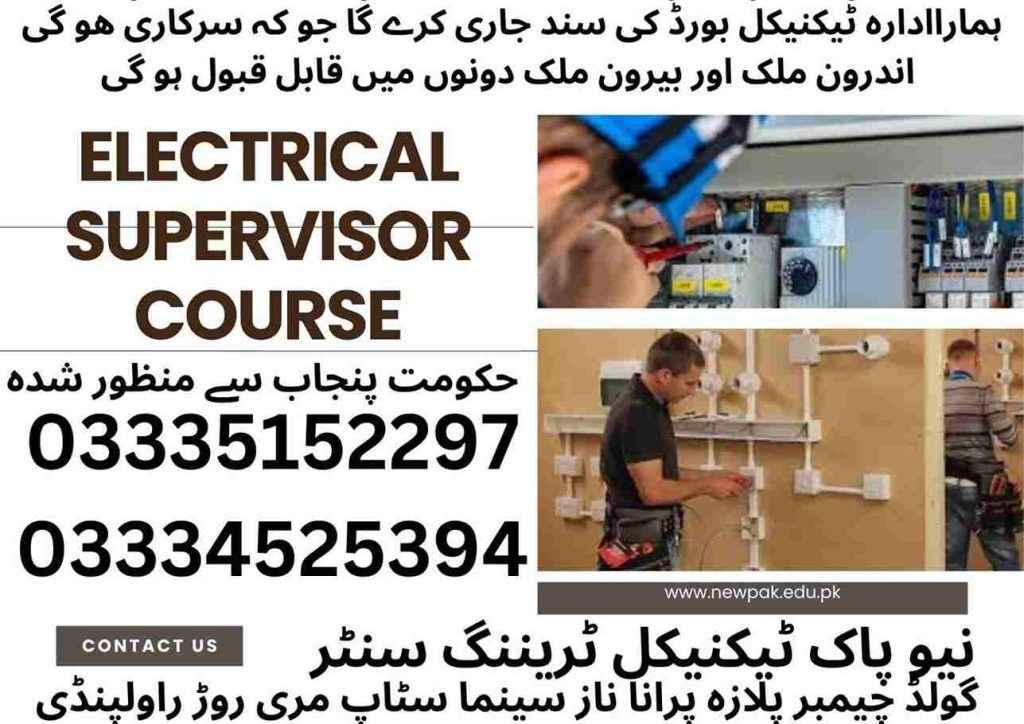
Electrical Supervisor Course In Rawalpindi Islamabad
The Electrical Supervisor course provides students with a comprehensive understanding of electrical systems, installations, and maintenance principles and practices. Offered as part of a professional electrical training center or electrical engineering trade school, this program equips students with the necessary skills and knowledge to effectively manage electrical systems and installations. The course covers a range of topics, including electrical theory, safety, codes and regulations, electrical systems design, installation, and maintenance.
Course Overview
Launch your career with this course. This hands-on program is ideal for those pursuing roles in electrical supervision, building electrician level 2, or industrial electrician training. Covering electrical systems, safety codes, and project management, this course prepares you for leadership in residential, commercial, and industrial settings.

Course Duration
06 | Months
- Electrical Theory and Fundamentals
- Electrical Safety and Codes
- Electrical Machines and Magnetism
- Building Electrical Systems Design
- Maintenance and Troubleshooting
- Project Management & Industry Practices
01 | Year
- Electrical Theory and Fundamentals
- Electrical Safety and Codes
- Electrical Machines and Magnetism
- Building Electrical Systems Design
- Maintenance and Troubleshooting
- Project Management & Industry Practices
- Advanced Electrical Systems Design
- Energy Efficiency and Sustainability
- Advanced Electrical Codes and Compliance
- Electrical Estimation and Budgeting
- Automation and Control Systems
- Capstone Project & Career Preparation
Course Outline (6 Months)
Electrical Theory and Fundamentals
Month 1
- Basic electrical quantities (voltage, current, resistance, power)
- AC/DC circuits and Ohm’s Law
- Electrical units, measurements, and tools (multimeter, etc.)
- Circuit types: series, parallel, combination
- Introduction to electrical drawings and schematics
Electrical Safety and Codes
Month 2
- Occupational health and safety procedures
- Personal Protective Equipment (PPE)
- Grounding and shock prevention
- Building Code of Pakistan (BCP) – Electrical Installations
- Pakistan Electric and Telecommunication Safety Code (PETSAC)
Electrical Machines and Magnetism
Month 3
- Principles of transformers, generators, and motors
- Electromagnetism and motor applications
- Motor starting methods and basic control
- Maintenance of electrical machines
- Power factor and reactive power concepts
Building Electrical Systems Design
Month 4
- Building load analysis and service entrance planning
- Branch circuits, lighting design, and emergency systems
- Power distribution and grounding systems
- Design using the National Electrical Code (NEC) or Pakistani standards
- Electrical drawing interpretation: single-line, panel schedules
Maintenance and Troubleshooting
Month 5
- Common faults and basic troubleshooting techniques
- Electrical test instruments: multimeters, clamp meters, etc.
- Preventive vs. predictive maintenance
- Emergency response and electrical fire hazards
- Maintenance planning and safety documentation
Project Management & Industry Practices
Month 6
- Project planning and scheduling
- Cost estimation and budgeting for electrical projects
- Procurement and resource management
- Leadership and communication skills for supervisors
- Overview of electrical certification and career pathways
Course Outline (1-Year)
Months 1–6: Basic Electrical Supervisor Course In Rawalpindi Islamabad
(Same course content as the 6-month program but with more detail, role-plays, software demos, and assessments.)
Advanced Electrical Systems Design
Month 7
- High-capacity distribution systems
- Load balancing and power quality
- Coordination studies for breakers and fuses
- Surge protection systems
- Fault analysis techniques
Energy Efficiency and Sustainability
Month 8
- Energy-efficient lighting and motor systems
- Power-saving strategies in industrial settings
- Renewable energy integration (solar, wind)
- Environmental standards and sustainability in electrical works
- Energy audit basics and tools
Advanced Electrical Codes and Compliance
Month 9
- In-depth study of BCP Chapter 27 and PETSAC
- Legal and regulatory documentation
- Inspection and approval processes
- International standards (IEC) relevant to Pakistan
- Role of Pakistan Engineering Council (PEC)
Electrical Estimation and Budgeting
Month 10
- Advanced estimation techniques and software tools
- Bill of quantities (BOQ) preparation
- Tender documentation and bidding processes
- Financial control during project execution
- Value engineering in electrical design
Automation and Control Systems
Month 11
- PLCs and their programming basics
- SCADA systems architecture and application
- Motor control systems and VFDs
- Building Management Systems (BMS)
- Introduction to IoT in electrical automation
Capstone Project & Final Evaluation
Month 12
- Group-based electrical system project
- Hands-on circuit design and testing
- Project documentation and report writing
- Oral presentation and viva
- Industry guest sessions and career counseling

Career Opportunities
- Electrical Supervisor
- Electrical Project Manager
- Electrical Estimator
- Electrical Maintenance Engineer
- Electrical Consultant
- Electrical Sales Representative
- Electrical System Design
- Lighting Systems
- Power Distribution Systems
- Special Systems
Conclusion
The Electrical Supervisor Course in Rawalpindi Islamabad equips students with a complete skill set in electrical systems, safety standards, system design, and project management. Delivered through a professional electrical training centre or electrical engineering trade school, this program blends theory with hands-on experience for real-world readiness. Whether you aim to lead installations or manage projects, this electrical course opens doors to rewarding careers across the industry.






